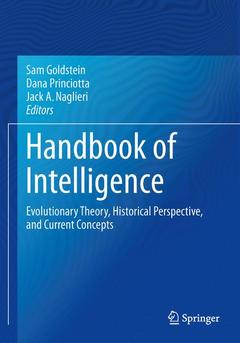Description
Handbook of Intelligence, 1st ed. 2015
Evolutionary Theory, Historical Perspective, and Current Concepts
Coordinators: Goldstein Sam, Princiotta Dana, Naglieri Jack A.
Language: English
Subjects for Handbook of Intelligence:
Handbook of Intelligence
Publication date: 11-2015
Support: Print on demand
Publication date: 11-2015
Support: Print on demand
Handbook of Intelligence
Publication date: 12-2014
498 p. · 17.8x25.4 cm · Hardback
Publication date: 12-2014
498 p. · 17.8x25.4 cm · Hardback
Description
/li>Contents
/li>Biography
/li>Comment
/li>
Numerous functions, cognitive skills, and behaviors are associated with intelligence, yet decades of research has yielded little consensus on its definition. Emerging from often conflicting studies is the provocative idea that intelligence evolved as an adaptation humans needed to keep up with ? and survive in ? challenging new environments.
The Handbook of Intelligence addresses a broad range of issues relating to our cognitive and linguistic past. It is the first full-length volume to place intelligence in an evolutionary/cultural framework, tracing the development of the human mind, exploring differences between humans and other primates, and addressing human thinking and reasoning about its own intelligence and its uses. The works of pioneering thinkers ? from Plato to Darwin, Binet to Piaget, Luria to Weachsler ? are referenced to illustrate major events in the evolution of theories of intelligence, leading to the current era of multiple intelligences and special education programs. In addition, it examines evolutionary concepts in areas as diverse as creativity, culture, neurocognition, emotional intelligence, and assessment.
- The evolution of the human brain from matter to mind
- Social competition and the evolution of fluid intelligence
- Multiple intelligences in the new age of thinking
- Intelligence as a malleable construct
- From traditional IQ to second-generation intelligence tests
- The evolution of intelligence, including implications for educational programming and policy.
The Handbook of Intelligence is an essential resource for researchers, graduate students, clinicians, and professionals in developmental psychology; assessment, testing and evaluation; language philosophy; personality and social psychology; sociology; and developmental biology.
Preface.- SECTION 1. BACKGROUND.- The Roots of Human Intelligence: What Were We Before We Were Intelligent?.- Intelligence in Non primates.- Intelligence in Primates.- The Evolution of Language.- Intelligence in Humans.- The Origins of Intelligence as a Conceptual Construct: Plato, Pascal and Philosophy.- Modern Foundation: Darwin, Charcot and Dalton.- SECTION 2. THEORIES OF INTELLIGENCE.- Intelligence Defined: James, Wundt, Cattell, Thorndike and Yerkes.- Alfred Binet and the Children of Paris.- David Wechsler and the Soldiers of America.- Alan Kaufman and Intelligence Redefined as Cognitive Processing.- A.R. Luria and Intelligence Redefined as a Neuropsychological Construct.- Daniel Sternberg and Multiple Intelligences in the New Age of Thinking.- Daniel Goleman and Emotional Intelligence and Behavior.- Carol Dweck and Intelligence as a Malleable Construct.- SECTION 3. ASSESSMENT OF INTELLIGENCE.- The Connection Between Intelligence Tests and Theory of Intelligence.- Assessing Intellectual Knowledge.- Assessing Intellectual Ability.
Sam Goldstein, Ph.D. is a psychologist with areas of study in school psychology, child development, and neuropsychology. He is licensed as a psychologist and certified as a developmental disabilities evaluator in the State of Utah. Dr. Goldstein is a Fellow in the National Academy of Neuropsychology and American Academy of Cerebral Palsy and Developmental Medicine. He is a Board Certified Pediatric Neuropsychologist. Dr. Goldstein is an Adjunct Assistant Professor, Department of Psychiatry, University of Utah School of Medicine. Since 1980, Dr. Goldstein has worked in a private practice setting as the Director of a multidisciplinary team, providing evaluation, case management, and treatment services for children and adults with histories of neurological disease and trauma, autism, learning disability, adjustment difficulties, and attention deficit hyperactivity disorder. Dr. Goldstein is on staff at the University Neuropsychiatric Institute. He has served as a member of the Children’s Hospital Craniofacial Team. He has also been a member of the Developmental Disabilities Clinic in the Department of Psychiatry at the University of Utah Medical School.
Dr. Goldstein has authored, coauthored, or edited 50 clinical and trade publications, including 18 textbooks dealing with managing children’s behavior in the classroom, genetics, autism, attention disorders, resilience, and adult learning disabilities. With Barbara Ingersoll, Ph.D., he has coauthored texts dealing with controversial treatments for children’s learning and attention problems and childhood depression. With Anne Teeter Ellison, he has authored Clinician’s Guide to Adult ADHD: Assessment and Intervention. With Nancy Mather, Ph.D., he has completed three texts for teachers and parents concerning behavioral and educational issues. With Michael Goldstein, M.D., he has completed two texts on attention deficit hyperactivity disorder. He has edited three texts with Cecil Reynolds, Ph.
Approaches intelligence comprehensively from an evolutionary perspective
Explores the evolution of intelligence and the forces that have driven its development, particularly in the human species
Provides an overview of intelligence in other species
Offers a historical overview of intelligence theories and assessment methods during the past 130 years
Includes supplementary material: sn.pub/extras
© 2024 LAVOISIER S.A.S.




